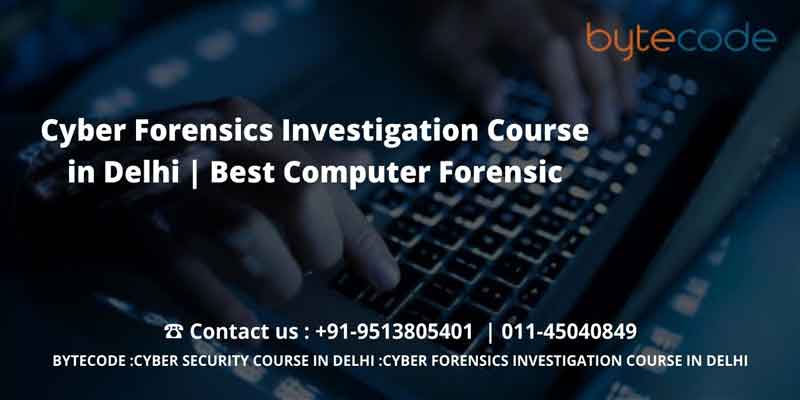What is the cyberforensic investigation in Delhi?
Cyber forensic investigators are specialists in investigating encrypted information utilizing different sorts of programming and devices. The undertakings for cyber investigators include recuperating erased documents, breaking passwords, and discovering the wellspring of the security breach.
What are cyber forensics tools?
There are some cyber-forensic tools mentioned below
Network forensic tools.
Database analysis tools.
File analysis tools.
Registry analysis tools.
Email analysis tools.
OS analysis tools.
Disk and data capture.
What will you learn in the Cyber Forensics Investigation course in Delhi?
The Cyber Forensics Investigation Course in Delhi is meant for those who want to join the field of computer forensics. The Cyber Forensics Investigation Course in Delhi will start with the basics and then cover advanced tools and techniques. The Cyber Forensics Investigation Course follows a methodological approach & effective methods for solving the case, which are as follows: The Cyber Forensics Investigation Course in Delhi will prepare you in the areas of cybercrimes related to case handling, investigating techniques, data recovery, damaged/deleted data, or encrypted data. The Online Cyber Forensics Investigation Course in Delhi comprises many types of cyber forensics programs that will facilitate individuals to conduct a smooth investigation.
The tools and techniques taught in the Cyber Forensics Investigation course in Delhi include the following problems: mishandling of confidential data, violation of intellectual property rights, theft of trade secrets, and other types of online fraud. In a cyberforensics investigation, an investigator uses different kinds of methods and techniques for faster case resolution.
Cyber Forensics Course, Computer Forensics Course and Digital Forensics Training
A computer forensics investigator might go by a variety of names. A digital forensics investigator, a computer forensics examiner, a computer forensics analyst, or a cyber forensics detective are all terms used to describe a cyber forensics investigator. The task is the same, no matter what the title is. The knowledge and capability to perform cyberforensics work are the most critical aspects.
With the rise in hacking occurrences around the world, the demand for computer forensics training and trained professionals has skyrocketed. One of the fastest-growing occupations in the twenty-first century is digital forensics, sometimes known as cyber forensics or computer forensics. It is the process of gathering, securing, analyzing, identifying, and presenting digital evidence. It is a process of collection, safeguarding, analysis, identification, and presentation of digital evidence that can be used in the investigation of technology-related crime for the legal process.
Our cyber forensics course instructors or investigators have a unique combination of experience, resources, and abilities that are required to offer high-level cyber forensics training. Each instructor has at least ten years of expertise as a cyber forensics investigator in the government, private sector, and military. delivering an advanced cyber forensics course for client needs.
Content For Best Cyber Forensics Investigation Course in Delhi
Module 01: What is Computer Forensics?
Module 02: Methods by which Computers Get Hacked
Module 03: Computer Forensics Investigation Process
Module 04: Digital Evidence Gathering
Module 05: Computer Forensics Lab
Module 06: Setting up Forensics Lab
Module 07: Understanding Hard Disk
Module 08: File Systems Analysis: Linux/Window/mac
Module 09: Windows File Systems Forensics
Module 10: Data Acquisition Tools and Techniques
Module 11: Data Imaging Techniques and Tools
Module 12: Recovery Deleted Files and Folders
Module 13: Deleted Partitions Recovery Technique
Module 14: Forensics Investigations Using the Forensic Toolkit (FTK)
Module 15: Forensics Investigations Using Forensics Toolkit (Oxygen)
Module 16: Forensics Investigations Using Encase Tool
Module 17: Stenography and Image File Forensics
Module 18: Application Password Crackers
Module 19: Log Computing and Event Correlation
Module 20: Network Forensics Tools: Cellebrite Tool
Module 21: Investigating Tools
Module 22: Investigating Network Traffic: Wireshark
Module 23: Investigating Wireless Attacks
Module 24: Investigating Web Application Attacks via Logs
Module 25: Tracking and Investigating Various Email Crimes
Module 26: Detailed Investigate Report
Module 27: Computer Forensics: Investigation Techniques
Module 28: Roles and Responsibilities
Module 29: Computer Forensics: System Password Changes Techniques
Module 30: Computer Forensics: System Password Cracking Techniques
Module 31: Web Attacks Investigation
Module 32: Common DOS & DDOS Attack Types
Module 33: Case Management (Case Handling)
Module 34: Cyber Forensics: Firewall Handling
Course Description
The Cyber Forensics Investigation Course in Delhi will prepare you in the areas of cybercrimes related to case handling, investigating techniques, data recovery, damaged/deleted data, or encrypted data.
The Online Cyber Forensics Investigation Course in Delhi comprises many types of cyber forensics programs that will facilitate individuals to conduct a smooth investigation.
The tools and techniques taught in the Cyber Forensics Investigation course in Delhi include the following problems: mishandling of confidential data, violation of intellectual property rights, theft of trade secrets, and other types of online fraud. In a cyber forensics investigation, an investigator uses different kinds of methods and techniques for faster case resolution.
Frequently Asked Questions
About the cyber forensics investigation course in Delhi
- Where can I join the cyber forensics investigation course in Delhi?
Craw Security is the best institute that provides cyber forensics investigation courses in Delhi. anyone can join the institute; contact for more information
1st Floor, Plot no. 4, Lane no. 2, Kehar Singh Estate Westend Marg, Behind Saket Metro Station
Saidulajab New Delhi, 110030
+91 742 811 6667; 964 364 8668; 742 810 6667
Email ID: [email protected] | [email protected]
- Which is the first type of forensic tool?
Identification. It is the first step in the forensic process. The identification process mainly includes things like what evidence is present, where it is stored, and lastly, how it is stored (in which format). Electronic storage media can be personal computers, Mobile phones, PDAs, etc
Table of Contents
